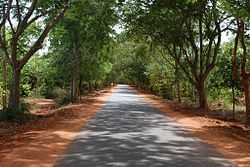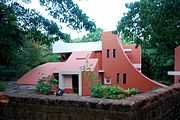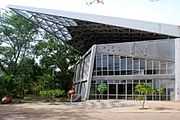Auroville
| Auroville | |
|---|---|
| town | |
|
Town hall of Auroville | |
 Auroville | |
| Coordinates: 12°0′25″N 79°48′38″E / 12.00694°N 79.81056°ECoordinates: 12°0′25″N 79°48′38″E / 12.00694°N 79.81056°E | |
| Country | India |
| State | Tamil Nadu |
| District | Viluppuram |
| Population (2014) | |
| • Total | 2,345 |
| Languages | |
| • Official | Tamil |
| Time zone | IST (UTC+5:30) |
| PIN | 605101 |
| Telephone code | 0413 |
| Vehicle registration | TN-16,PY-01 |
| Website | http://www.auroville.org/ |
Auroville (City of Dawn) is an experimental township in Viluppuram district in the state of Tamil Nadu, India, near Puducherry in South India. It was founded in 1968 by Mirra Alfassa (also known as "The Mother") and designed by architect Roger Anger.[1][2][3] As stated in Alfassa's first public message about the township, "Auroville is meant to be a universal town where men and women of all countries are able to live in peace and progressive harmony, above all creeds, all politics and all nationalities. The purpose of Auroville is to realize human unity."
History
Auroville was founded as a project of the Sri Aurobindo Society on Wednesday 28 February 1968 by Mirra Alfassa, "The Mother". She was spiritual collaborator of Sri Aurobindo, who believed that "man is a transitional being". Mother expected that this experimental "universal township" would contribute significantly in the "progress of humanity towards its splendid future by bringing together people of goodwill and aspiration for a better world." Mother also believed that such a universal township will contribute decisively to the Indian renaissance (Ref. Mother's Agenda, Vol. 9, dt.3.02.68).
In the inauguration ceremony attended by delegates of 124 nations on 28 February 1968, Mother gave Auroville its 4-point Charter setting forth her vision of Integral living:
- Auroville belongs to nobody in particular. Auroville belongs to humanity as a whole. But to live in Auroville, one must be the willing servitor of the Divine Consciousness.
- Auroville will be the place of an unending education, of constant progress, and a youth that never ages.
- Auroville wants to be the bridge between the past and the future. Taking advantage of all discoveries from without and from within, Auroville will boldly spring towards future realisations.
- Auroville will be a site of material and spiritual researches for a living embodiment of an actual Human Unity.
The Matrimandir
In the middle of the town is the Matrimandir, which was conceived by "The Mother" as "a symbol of the Divine's answer to man's aspiration for perfection". Silence is maintained inside the Matrimandir to ensure the tranquility of the space and entire area surrounding the Matrimandir is called Peace area. Inside the Matrimandir, a spiraling ramp leads upwards to an air-conditioned chamber of polished white marble referred to as "a place to find one's consciousness".
Matrimandir is equipped with a solar power plant and is surrounded by manicured gardens. When there is no sun or after the sunset, the sunray on the globe is replaced by a beam from a solar powered light.
Radiating from this center are four "zones" of the City Area: the "Residential Zone", "Industrial Zone", "Cultural (& Educational) Zone" and "International Zone". Around the City or the urban area, lies a Green Belt which is an environment research and resource area and includes farms and forestries, a botanical garden, seed bank, medicinal and herbal plants, water catchment bunds, and some communities.
Government, belief system
The Auroville Foundation is an autonomous body under the Ministry of Human Resource Development through an act of the Indian Parliament.[4][5] The Foundation is composed of three entities: the Residents of Auroville (Residents Assembly), the Governing Board and the International Advisory Council. The HRD ministry appoints the seven members of the Governing Board and the five members of the International Advisory Council. There is also a Secretary to the Foundation, appointed by the Government of India, who resides and has an office with supporting staff in Auroville. [6] The Foundation currently owns about half of the total land required for the township. The remaining lands are being purchased whenever funds are available.
Auroville should be at the service of Truth, beyond all social, political and religious conviction. Auroville is the effort towards peace, in sincerity and Truth.[7]
Society and population

Although originally intended to house 50,000, as of May 2014, the actual population today is 2,345 (1,804 adults and 541 minors), coming from 50 nationalities.[9] The community is divided up into neighborhoods with English, Sanskrit, French and Tamil names like Aspiration, Arati, La Ferme, Auromodel and Isaiambalam.[10]


Demographics
| Nationality | Number |
|---|---|
| Indian | 1005 |
| French | 336 |
| Germans | 213 |
| Italians | 142 |
| Dutch | 87 |
| Americans | 86 |
| Russians | 65 |
| Spaniards | 47 |
| Britons | 44 |
| Swiss | 40 |
| Koreans | 33 |
| Israelis | 31 |
| Belgians | 28 |
| Swedes | 24 |
| Canadians | 20 |
| Ukrainians | 17 |
| Australian | 17 |
| Chinese | 11 |
| Argentinian | 9 |
| Japanese | 9 |
| Austrians | 8 |
| South African | 8 |
| Slovenes | 6 |
| Hungarians | 5 |
| Uzbeks | 5 |
| Brazilians | 4 |
| Danes | 4 |
| Latvians | 4 |
| Mexicans | 4 |
| Belorussians | 3 |
| Gurkhas | 3 |
| Portuguese | 3 |
| Tibetans | 3 |
| Bulgarians | 2 |
| Colombians | 2 |
| Ethiopians | 2 |
| Sri Lankans | 2 |
| Moldovans | 2 |
| Czech | 1 |
| Egyptians | 1 |
| Finn | 1 |
| Irish | 1 |
| Kazakhs | 1 |
| Lithuanians | 1 |
| Filipino | 1 |
Population graphs
Evolution of Aurovilian population.[11]
-

1. General evolution of aurovilian population.[1]
-

2. Evolution of aurovilian population for six nationalities.[1]
-

3. Evolution of aurovilian population for six nationalities.[1]
-

4. Evolution of aurovilian population for six nationalities.[1]
-

5. Evolution of aurovilian population for six nationalities.[1]
-

6. Number of nationality in auroville from December 1999 to November 2014.[1]
-
.png)
7. Auroville population by category of age (2010 - 2014).[2]
-
.png)
8. Gender in Auroville (2014).[2]
-
.png)
9. Auroville population by nationality (2014).[2]
-
.png)
10. Auroville population by communitiy (2014).[2]
-
.png)
11. Auroville population by seniority (2014).[2]
-
.png)
12. Auroville population by working place (2014).[2]
-
.png)
13. Auroville population by fonction (2014).[2]
-
.png)
14. Auroville population by status (2010-2014).[2]
- ^ a b c d e f "Census - Auroville population". www.auroville.org. Auroville. Retrieved 25 December 2014.
- ^ a b c d e f g h "Data table about Auroville residets and new comer + graph". https://docs.google.com/spreadsheets/. Lionel Scheepmans. Retrieved 25 December 2014.
Economy

Instead of paper and coin currency, residents are given account numbers to connect to their central account. Visitors, however, are requested to get a temporary account and an Aurocard (a debit card).
Residents of Auroville are expected to contribute a monthly contribution to the community. They are asked to help the community whenever possible by work, money, or kind. "Guest contribution", or a daily fee payable by the guests of Auroville, constitutes a part of Auroville's budget. There is a system of “maintenance”, whereby those Aurovilians who need can receive from the community a monthly maintenance which cover simple basic needs of life. Auroville's economy and its overall life are of an evolving nature and there are ongoing experiments to reach closer to the vision.[12]
Although the Government of India owns and manages the Auroville Foundation, it only finances a small part of Auroville's budget, which is mainly formed by contributions from Auroville's commercial units which contribute 33% of their profits to Auroville's Central Fund, and by donations. There are guest houses, building construction units, information technology, small and medium scale businesses, producing and re-selling items such as handmade paper for stationery items, as well as producing its well-known incense sticks, which can be bought in Auroville's own shop in Puducherry, or are sold around India and abroad. Each of these units contributes a considerable part of their profits to the township. Over 5,000 people, mostly from the nearby localities, are employed in various sections and units of Auroville.
Other activities include afforestation, organic agriculture, basic educational research, health care, village development, appropriate technology, town planning, water table management, cultural activities and community services.
Location


Auroville is composed of a cluster of properties some 12 km (7.5 mi) north of Pondicherry. It can be easily reached via the East Coast Road (ECR) which connects Chennai and Pondicherry. The visitor centre and Matrimandir can be reached by travelling 6 km (3.7 mi) westwards from the signposted turnoff at the ECR. Turning east leads directly to Auroville's private beach called Repos, several hundred metres away.
Climate
It is included in the sub-humid tropics and situated on a plateau region with its maximum elevation of 32 m (105 ft) above sea level located in the Matrimandir area. The annual rainfall average is 1,200 mm (47 in) mainly from the SW monsoon (June to Sept.) and NE monsoon (Nov to Dec) with a dry period of approx 6 months. The average maximum temperature is 32.2 °C (90.0 °F), average minimum 20 °C (68 °F).
Communications and media
The Auroville website provides open as well as restricted forums for various projects, interests, organizations and outreach which make up the life of the community.[13] The opinions expressed in these publications are not necessarily those of the community at large. Auroville radio website provides a lot of recordings and daily news covering events in Auroville. Auroville has a small 'OutreachMedia' team to regulate visits of journalists and film/video makers. Their aim is to ensure that all journalists and filmmakers get official, up-to-date information and representative footage from reliable sources.
Films about Auroville
At present, any filming within and about Auroville requires permission from the Government of India.[14][15] Many filmmakers visit Auroville and there is a wide range of films available. To name a few:
- City of the Dawn, full length, 80 min version, 2010.[16]
- Auroville, the outline of a world, full length, 25 minutes, 2009.[17]
- There are six 30 min videos on Auroville by Russian filmmakers.[20]
- Interesting Auroville topics can also be seen on AurovilleTV,[21] and the films about Auroville screened at the biennial Auroville Film Festival.[22]
Controversy
In May 2008, the BBC produced a 10-minute Newsnight film about Auroville, which was aired on TV.[23] A short version was aired on Radio 4's "From Our Own Correspondent". It also appeared on BBC On-line.[24] The reports contrasted the idealism of its founders with allegations by some people that the community tolerates pedophiles, especially in a school that Auroville has established for local village children. Auroville filed an official complaint to the BBC that the report was biased, untrue and contravened BBC editorial ethical guidelines - after investigations, although a few inaccuracies were identified, Ofcom did not uphold the complaint.[25] In order to protect children in the Auroville area from child abuse, the city instituted an Auroville Child Protection Service which is in action ever since. At the time the BBC report somewhat damaged Auroville's reputation.
Gallery
-

Afsana Guesthouse
-

Savitri Bhawan
-

A Sculpturous House in Auroville
-

Vérité Learning Centre
-

Vérité Learning Centre
-

Bharat Niwas
-
.jpg)
Auroville Unity Park near Matrimandir
References
- ↑ "Roger Anger as architect". Boloji.com. Retrieved 2012-01-26.
- ↑ "Auroville founded by Mira Richards". Architectureweek.com. 2005-11-16. Retrieved 2012-01-26.
- ↑ "Mirra Alfassa as other name". Auroville.info. Retrieved 2012-01-26.
- ↑ "The Auroville Foundation Act (1988)". Education.nic.in. Retrieved 2012-01-26.
- ↑ "Auroville News & Notes No.251". Retrieved 2012-01-26.
- ↑ The Auroville Handbook 2013 page 14
- ↑ The Mother on Auroville, page 2, published 1999 Sri Aurobindo Ashram Trust
- ↑
- ↑ "Official census of April, 2008". Auroville.org. Retrieved 2012-01-26.
- ↑ List of neighbourhoods.
- ↑ "Census - Auroville population November 2014". www.auroville.org. Auroville. Retrieved 25 December 2014.
- ↑ "Forbes India". Business.in.com. Retrieved 2012-01-26.
- ↑ Auroville Journals & newsletters
- ↑ News & Notes 10 March 2012 [438]
- ↑ http://www.auroville.org/journals&media/outreachmedia.htm
- ↑ http://www.cultureunplugged.com/play/7703/City-of-the-Dawn
- ↑ https://vimeo.com/20071836
- ↑ http://www.youtube.com/watch?v=GX9iBZGvjlI
- ↑ http://www.youtube.com/watch?v=aOfT25ri7rU
- ↑ https://vimeo.com/vashuk/videos
- ↑ http://aurovilletv.org
- ↑ http://aurovillefilmfestival.org/films-2013-about-av/
- ↑ BBC Two (22 May 2008). Indian town's sex abuse claims. Retrieved on: 21 June 2008.
- ↑ BBC News (24 May 2008). Local concerns over Indian utopia. Retrieved on: 21 June 2008.
- ↑ http://stakeholders.ofcom.org.uk/binaries/enforcement/broadcast-bulletins/obb157/Issue157.pdf
Bibliography
English Titles:
- Abundance Publications. The Auroville Handbook.Pondicherry: All-India Press, 2007.
- Auroville – Development Perspectives 1993–1998 – An Invitation To Participate, Typoscript, Autoren/Hrsg. Auroville Development Group, Bharat–Nivas, Auroville 1993, no ISBN
- K.M. Agarwala (Hrsg.): Auroville - The City Of Dawn, Sri Aurobindo Center New Delhi 1996, no ISBN
- Auroville References in Mother's Agenda, Auroville Press, Auroville, no Y., no ISBN
- Jerome Clayton Glenn: Linking the Future: Findhorn, Auroville Arcosanti, published by Hexiad Project/ Center on Technology and Society, Cambridge, Massachusetts 1979, no ISBN
- Anupama Kundoo: Roger Anger, Research on Beauty, Architecture 1953-2008, JOVIS Verlag Berlin 2009, ISBN 978-3-86859-006-7
- Peter Richards: Experience!Auroville – Guide Book for Guests and Visitors, Pondicherry 2000, no ISBN
- Savitra: Auroville: Sun-Word Rising – A Trust For The Earth, published by The Community of Auroville, Auroville 1980, no ISBN
- The Auroville Adventure – Selections from ten years of Auroville Today, published by Auroville Today, Auroville 1998, no ISBN
- The Auroville Experience – Selections from 202 issues of Auroville Today, November 1988 to November 2005, published by Auroville Today, Auroville 2006, no ISBN
- Jessica Namakkal, European Dreams, Tamil Land: Auroville and the Paradox of a Postcolonial Utopia, in Journal for the Study of Radicalism, Volume 6, Number 1, Spring 2012, pp. 59-88 (Published by Michigan State University Press)
German titles:
- Mira Alfassa: Die Mutter über Auroville, Auropublikations (Hrsg.), Sri Aurobindo Ashram Trust, Pondicherry 1978, no ISBN
- Renate Börger: Auroville – Eine Vision blüht, Verlag Connection Medien, Niedertaufkirchen 2004, 3. veränderte Aufl., ISBN 3-928248-01-4
- Alan G. (Hrsg.): Auroville – Ein Traum nimmt Gestalt an, o.O. (vermutlich Auroville/ Pondicherry) 1996, 1. dt. Aufl., no ISBN
- Michael Klostermann: Auroville – Stadt des Zukunftsmenschen; Fischer Taschenbuch Verlag, Frankfurt/M., Februar 1976; ISBN 3-436-02254-3
External links
| Wikimedia Commons has media related to Auroville. |
- Official site of Auroville
- Radio with daily updates from Auroville
- Auroville News
-
 Auroville travel guide from Wikivoyage
Auroville travel guide from Wikivoyage - Ashley Walters (11 June 2014). "Auroville: The Road to Utopia". Ideas (Podcast). CBC Radio. Retrieved 2014-06-14. (54 min)
- Bill Davies (1971). "The India Trip" (Documentary). National Film Board of Canada. Retrieved 2015-03-22. (49 min 30 s)
